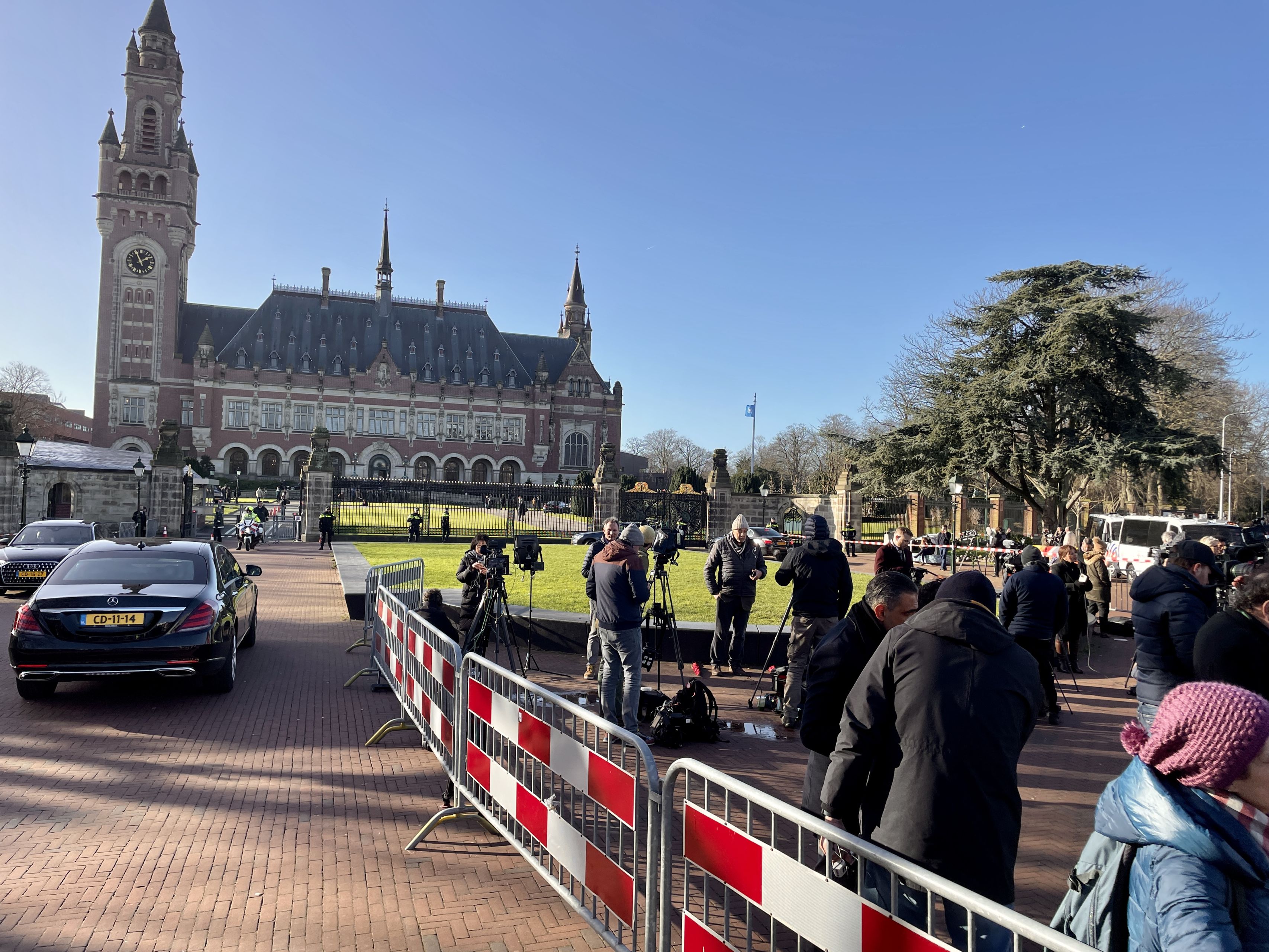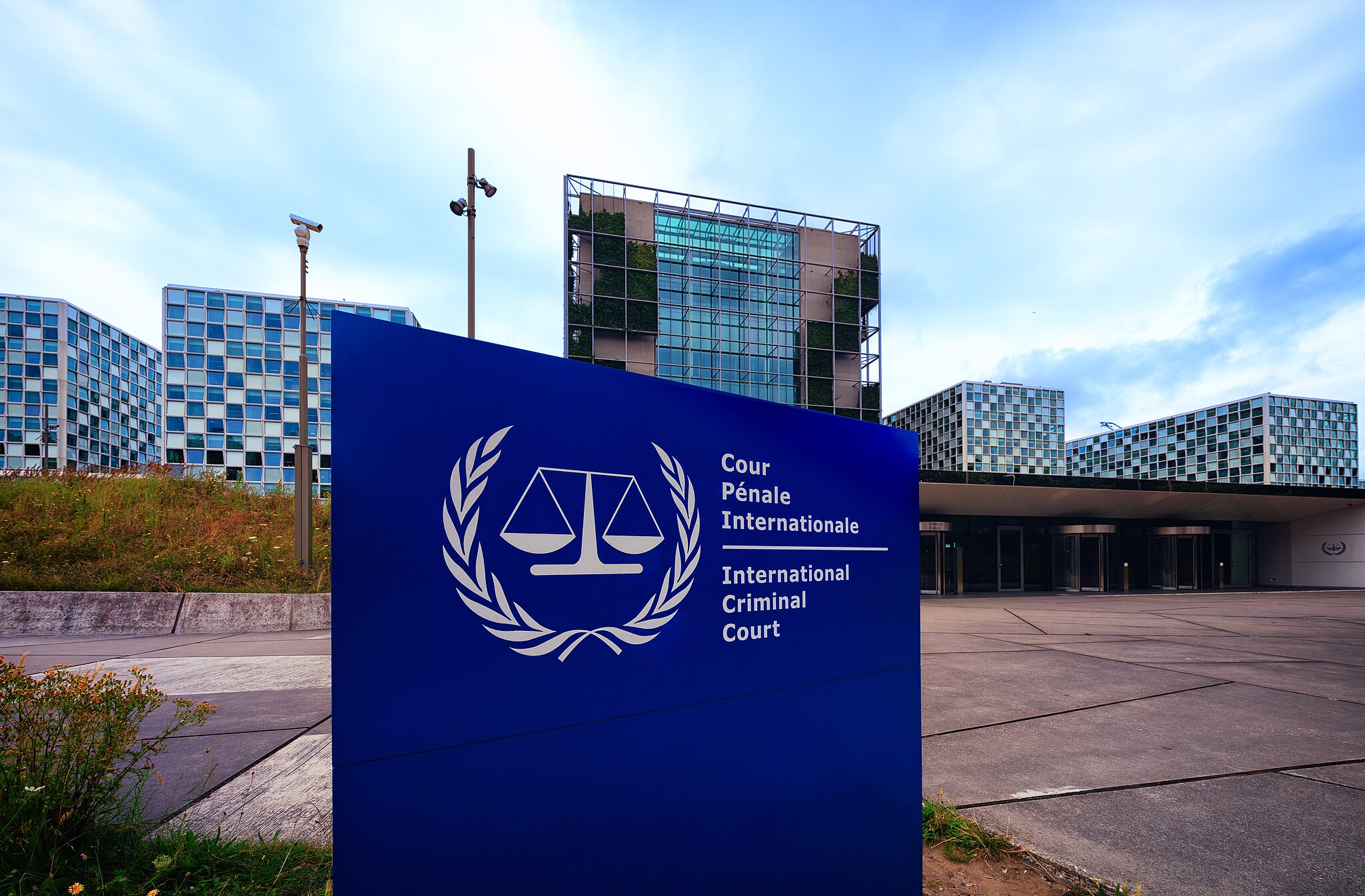Lezing | Studium Generale
Hosting Global Justice: The Netherlands and International Courts (ICJ & ICC)
- Datum
- maandag 12 mei 2025
- Tijd
- Toelichting
- Free and open to all. Please register below.
- Bezoekadres
-
Anna van Buerenplein
Anna van Buerenplein 301
2595 DG Den Haag - Zaal
- 2.21
Deze activiteit is volledig Engelstalig. Van harte welkom!
It is often suggested that, as the host state of both the International Court of Justice (ICJ) and the International Criminal Court (ICC), the Netherlands holds a “special position” in terms of compliance with international law. But what does this mean exactly? In this Studium Generale lecture, Otto Spijkers and Letizia Lo Giacco discuss the legal and political dimensions of this “special position”. The lecture is chaired by Niels Blokker.
Registration
Please register here. LU-Card holders can attend without registering. Everyone who registers will receive a reminder with practical details the day before the lecture.
Programme
The Advisory Council on International Affairs (AIV) reminded the Netherlands Government of its “special position in terms of compliance with international law [inter alia] given its role as the host country of the International Court of Justice”.1 In my presentation, I aim to explore how this “special position” as host state of the International Court of Justice (ICJ) in terms of compliance with international law can be understood and operationalized. I seek to examine how the Netherlands Government interprets and implements this role, looking at both historical contributions and, more importantly, its current contributions to the work of the ICJ.
Currently pending cases illustrate the Netherlands’ proactive engagement with the ICJ. For example, the Netherlands initiated proceedings against Syria concerning obligations under the Convention against Torture. Similarly, the Netherlands is preparing to take legal action against Afghanistan for breaches of the Convention on the Elimination of All Forms of Discrimination against Women. The Netherlands has also exercised its authority to intervene in key proceedings, including recent cases between Gambia and Myanmar, as well as between Ukraine and Russia, both related to the Genocide Convention. Finally, the Netherlands participated in the advisory proceedings relating to the obligations of States in respect of climate change.
This active engagement in some cases contrasts with the Netherlands’ stance in other currently pending proceedings, notably its more reserved approach to the case brought by South Africa against Israel concerning obligations under the Genocide Convention in the Gaza Strip. And we can mention the Netherlands’ limited engagement with advisory proceedings relating to the legal consequences arising from the policies and practices of Israel in the Occupied Palestinian Territories.
The AIV cautioned against the risks of perceived “double standards” in applying international law, noting how inconsistencies, which are often motivated by political rather than legal considerations, can undermine the credibility of both the Netherlands and the broader international legal system, including the ICJ itself:
"The inconsistent invocation and application of rules of international law contribute significantly to the undermining and politicization of that body of law, and undercut the overarching idea that international law applies, and is applied equally, to all states. Over the past year, inconsistency in the invocation and application of international law by Europe and European states has been repeatedly raised in the international political arena, including by UN Secretary-General António Guterres. The efforts that the Netherlands and Europe have made to create accountability mechanisms in the war in Ukraine, for example, find no equivalent when it comes to the Israeli-Palestinian conflict. Unbalanced enforcement fuels anti-Europeanism and anti-Americanism in many countries of the Global South."2
In my presentation, I propose to closely examine this aspect of consistency, emphasizing how the Netherlands can more effectively align its actions with its “special position.” A consistent, principled support of and participation in the ICJ’s work not only strengthens the Netherlands’ credibility but also enhances the legitimacy of international legal institutions, especially the ICJ itself.
1Advisory Council on International Affairs (Adviesraad Internationale Vraagstukken, AIV), Towards a New Direction for The Netherlands in The Israeli-Palestinian Conflict, 23 October 2024, https://www.adviesraadinternationalevraagstukken.nl/, at p. 25.
2Idem, p. 18.
The International Criminal Court (ICC) lives in a political environment and, as such, is subject to some forms of political pressure or undue influence. For instance, it is not unusual for some state officers to view the performance of the Court’s mandate as interfering in their country’s own affairs or to openly criticize its decisions to start an investigation in a certain territory or to issue arrest warrants against people accused of international crimes. However, some forms of pressure or influence go beyond criticism: they hinder the functioning of the Court and the performance of its mandate as a judicial institution, and are therefore expressly prohibited as ‘interferences with the administration of justice’ under the Rome Statute - the treaty that established the ICC.
Much of the discussion on how to tackle such interferences has focused on the power of the ICC to exert jurisdiction over offences against the administration of justice. Article 70 of the Rome Statute gives the ICC the power to adjudicate over case of contempt of court, alongside its classical jurisdiction over international crimes under the material competence of the Court.
However, a less explored but equally important aspect concerns the role of the Netherlands as a host State of the ICC. The Netherlands holds a special position towards the Court, due to the Headquarters Agreement, which obliges the host state to ensure the “proper functioning of the Court”.1 Article 43(1) of the Headquarters Agreement, a provision relating to security, safety and protection of persons, states: “The competent authorities shall take effective and adequate action which may be required to ensure the security, safety and protection of persons referred to in this Agreement, indispensable for the proper functioning of the Court, free from interference of any kind.” Thus, Article 43 requires Dutch authorities to take all necessary and effective measures to ensure the security and protection of all persons associated with the Court.
Recently, people have turned to Dutch domestic courts to urge the Netherlands to fulfill the obligations stated by Article 43. One example is the recent complaint filed by Palestinian nationals to the Dutch Office of the Public Prosecutor,2 asking the State to take action against threats to the Court’s integrity.
This lecture aims to shed light onto the special role that the Netherlands has as a host state of the ICC, and on the challenges and limits that the Netherlands may face when complying with its obligations under the Headquarters Agreement.
1Entered into force on 1 March 2008 < ICCBD040108ENG1.pdf >.
2Criminal complaint filed for impeding and influencing ICC investigation into Palestine.
-

Photo by Otto Spijkers -

Photo by Tony Webster
About the speakers
Niels Blokker is Professor of International Institutional Law (Schermers Chair) at the Grotius Centre for International Legal Studies of Leiden University. He graduated from Leiden University (1984), where he also defended his PhD thesis (1989). From 1984 he was a lecturer, and subsequently a senior lecturer in the law of international organizations at Leiden University. In 2000 he was appointed senior legal counsel at the Netherlands Ministry of Foreign Affairs. In 2007 he became Deputy Legal Adviser at this Ministry. In August 2013 he left the Foreign Ministry and started working full-time at Leiden University.
His publications include International Regulation of World Trade in Textiles (dissertation, 1989), International Institutional Law (co-authored with the late Henry G. Schermers, 6th edition 2018), Proliferation of International Organizations (co-authored with the late Henry G. Schermers, 2000), The Security Council and the Use of Force (co-edited with Nico Schrijver, 2005), Saving Future Generations from the Scourge of War - the UN Security Council at 75 (2021). He is co-founder and co-editor-in-chief of the journal International Organizations Law Review. His current main research project centres on the governance of international courts and tribunals.
Letizia Lo Giacco is Assistant Professor of Public International Law at the Grotius Centre for International Legal Studies of Leiden University. Her research explores structural questions of international law, with a focus on courts and judicial practices in global governance, as well as questions of authority at the intersection between the public/private divide. Her current research investigates the role of private actors in areas of public interest from an institutional standpoint, as part of a long-term project on the 'publicness' of public international law.
Letizia holds an LLD in Public International Law from Lund University and an LLM in International Humanitarian Law from the Geneva Academy of International Humanitarian Law and Human Rights. She held positions as visiting fellow at the European University Institute (2024-2025), the Max Planck Institute for Comparative Public Law and International Law in Heidelberg, at the Amsterdam Centre of International Law, and at the Manchester International Law Centre, to which she was also an invited guest lecturer in international law (2018 and 2019). Prior to joining Leiden University, Letizia was an adjunct in public international law, international criminal law and international humanitarian law within the LLM in International Human Rights Law at Lund University Faculty of Law (Sweden). She also gained professional experience in international institutions including the UN Assistance to the Khmer Rouge Trials (UNAKRT), the Special Tribunal for Lebanon, and the European Commission (Kimberly Process).
Letizia is the author of Judicial Decisions in International Law Argumentation (Hart Publishing, 2022) and was the recipient of the 2024 Rosalyn Higgins Prize for her article "When a Dispute Exists: The Emerging Evidentiary Practice of the ICJ in Common Interests Proceedings" awarded every year to the best article published on the Law and Practice of International Courts and Tribunals. Letizia sits in the Board of Editors of the Leiden Journal of International Law. She is a founding member of the European Society of International Law interest group on international criminal justice and is the co-founder of the Leiden Hub on the Theory and History of International Law, an interdisciplinary platform for theoretical and/or historical questions on international law.
Otto Spijkers is Assistant Professor of International and European Law at Leiden University College (LUC), Faculty of Governance and Global Affairs of Leiden University. He teaches on sovereignty & statehood, law of the sea, structure and functioning of the European Union, as well as global security and collective action.
Before joining LUC, Otto was inter alia full professor of international law at Wuhan University’s China Institute of Boundary and Ocean Studies as well as its Research Institute of Environmental Law, and founding staff member of its International Water Law Academy. He was visiting lecturer inter alia at Peking University Law School, Xiamen University’s China International Water Law Program, the Università degli Studi di Salerno (Italy), and the Université Catholique d’Afrique Centrale (Yaoundé, Cameroon).
Prior to joining Wuhan University, he worked at the Utrecht Centre for Water, Oceans and Sustainability Law and Netherlands Institute for the Law of the Sea of Utrecht University. He wrote his doctoral dissertation, entitled The United Nations, the Evolution of Global Values and International Law, at the Grotius Centre for International Legal Studies of Leiden University. He also worked as public services coordinator at the Peace Palace Library – the home of the International Court of Justice, as international consultant and coordinator for the United Nations International Law Fellowship Program, as intern for the Appeals Chamber of the International Criminal Tribunal for Rwanda, and as intern for the Office of Legal Affairs of United Nations Headquarters.
Otto Spijkers studied the basics of international relations at the University of Sussex. He then studied international law at the University of Amsterdam, New York University School of Law (exchange student), and the Hague Academy of International Law (2009 session). He studied philosophy at the University of Amsterdam and the University of Malta (exchange).
